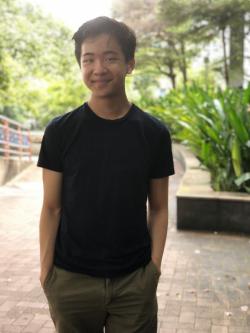
Toronto, Canada & Philadelphia, PA, United StatesAge: 19
Tell us a bit about yourself!
Growing up, I always had a fond interest in wildlife. This interest in wildlife soon broadened as I sought out to learn how I could better protect them and their habitats. From this, in Grade 10, I founded the Toronto Coalition of EcoSchools (TCE), a youth-run non-profit that advocates for environmental literacy and awareness in high school students. Running programs featuring university professors and a Nobel Peace Prize Laureate, I managed a team of over 50 ambassadors from over 30 schools and over 10 executive members.
In the summer of 2017, I worked as a Program Manager at GreenLearning, a Canadian environmental literacy non-profit where I drafted modules on social finance, co-operative businesses, renewable energy, and more. That summer, I was also selected as the youngest delegate from over 10,000 applications to attend the UNLEASH Innovation Lab in Denmark. Here I was given the opportunity to share my insights on environmental education and youth engagement with delegates from over 127 countries to develop solutions and insights to the UN Sustainable Development Goals (SDGs).
I currently attend the Wharton School of Business at the University of Pennsylvania with concentrations in Environmental Policy and Management and Management Science, where I have also become involved with the Hult Prize social entrepreneurship competition and Penn International Impact Consulting. I’m currently working as a Communications Assistant at EcoSpark, a leading citizen science and environmental education non-profit based in Toronto.
What inspired you to become a champion for the environment and environmental education?
I often credit my Grade 5 teacher for nurturing my sense of environmental stewardship. Although I have always had an interest in wildlife, it was through her lessons that my peers and I realized the negative implications that human actions have on their habitats and wellbeing. During high school, when I reflected on my own trajectory as a student and environmentalist, I realized how integral early education was to fostering my environmental consciousness. Without my teacher and the countless mentors that have guided me, I would not have had the same opportunities. This is what led me to launch the Toronto Coalition of EcoSchools and eventually dedicate myself to environmental education, as I strive to be that mentor or teacher in the lives of other students. I’m a firm believe that education is the key to nudging behavioural shifts in society, and knowing that I’m part of a larger collective effort to shape sustainability-minded future leaders is exciting.
What advice would you give to the next generation of leaders that are looking to bring about positive change in their communities through EE?
My two main pieces of advice are to 1) be fearless and receptive to taking risks, and 2) be adaptive.
First, I think it’s easy to get lost following the footsteps of others. Rather, don’t be afraid to stray off and start your own trail. Keep in mind that there are only two possible outcomes from taking a risk—succeeding and making a tangible impact, or failing and learning from your mistakes to better prepare yourself for the future.
Second, I often found it difficult to be adaptive in my plans and goals. However, in the past few years I’ve learned that the world is far too unpredictable for us to get lost in the micro-details. Our plans will inevitably change, and when they do you should be ready to adapt. Know your end goal, but understand that there are countless paths to reach it, all of them equally valid although they may vary in length and difficulty. Don’t let disruption discourage you, but rather take it as unavoidable and be ready for it.
If you had to live in one place for the rest of your life, where would it be?
It would definitely be Toronto. There’s a special Canadian-ness about Toronto that is hard to explain to those who have never lived here. It’s difficult to describe, but I credit it to the city’s multiculturalism, entrepreneurial spirit, and the generosity and politeness of the people who call Toronto home.
If you could be any animal or plant, what would you be and why?
Probably a dolphin. I’m drawn to their curious, inquisitive, intelligent, and social personality. They’re some of the smartest animals on Earth and are capable of communicating incredibly effectively with each other. They are also apex predators and rarely have to worry about being preyed on (except maybe by humans). Also, they’re adorable!